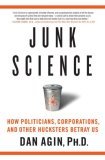I missed “Just Science” week by a couple of weeks, so here is my post to try to make up for it:

I have recently been reading a book called “Junk Science” by Dan Agin, who describes himself as a neuroscientist and biophysicist. The book discusses the many ways that legitimate science is twisted/altered/slanted so that the information reaching the public often bears no resemblance whatsoever to the actual science. This happens with environmental pollution, health issues, and genetically engineered food, and just to name a few. Perhaps blame can be placed on the media, politicians, large corporations, etc., but it seems there is another very important underlying issue, here, and that is the scientific literacy of the American public.
Without the basic tools of healthy skepticism and a basic knowledge of science, the “Average Joe” has no hope of understanding the filtered science that appears in the news. As scientists, why should we care? We have ways to communicate amongst ourselves, within the scientific community, but it seems the scientific community also has a responsibility to relate our work and findings to the Average Joe. So many issues — vaccinations for teenage girls against HPV, what food additives are controlled by the government, pollution guidelines for corporations — are decided by non-scientists and affected largely by politicians and lobbyists. In order for the work we do as scientists to go from being purely academic to improving everyday life, the public has to be on board. For them to be on the side of science, they have to understand it.
It seems that as scientists, we have a dire interest in ensuring the scientific literacy of everyone. So, the next time someone asks you to speak to a group of students or write an article for a “non-scientific” newsletter-type publication, think about where most people get their science information. Would you rather have them get it from you, a scientist, or from a CNN article that has been re-interpreted by several laypersons before reaching the public.
By the way, although I don’t agree with all of what Dr. Agin says, he raises several interesting points. It’s very thought-provoking.
2 responses to “Scientific Literacy”
Well written. Scientists sometimes shun scientifically interacting with the public, maybe because it takes too much effort. The public is often interested in science, but scientists need to be willing to speak with them in a way that the lay person comprhends. Of course, this will require that scientists understand their topic well. As Albert Einstein said, “You do not really understand something unless you can explain it to your grandmother.”
Nice post, Rebecca.
I agree, Kevin – there is a lot of effort involved in talking to the layman, and it’s not exactly part of our job description either 🙂 There are policy people out there but theres very little deep interaction with the scientific mainstream. Its like policy and public relations operate in an isolated bubble from the daily practice of science itself. There are places like the NIH that try to bridge the gap but again, it costs money to do effectively.
If anything I think the solution is to create more science blogging. If we do it ourselves from the ground up we can make an impact. We have to talk about what we know and make our own case.